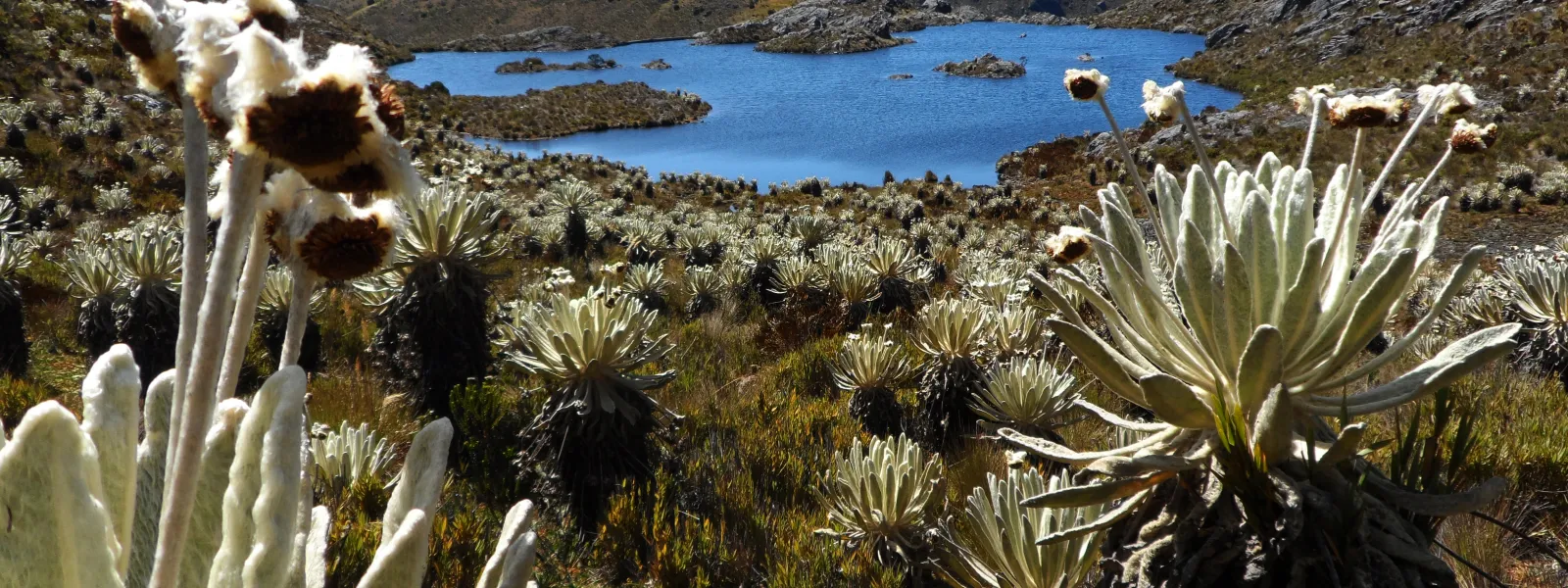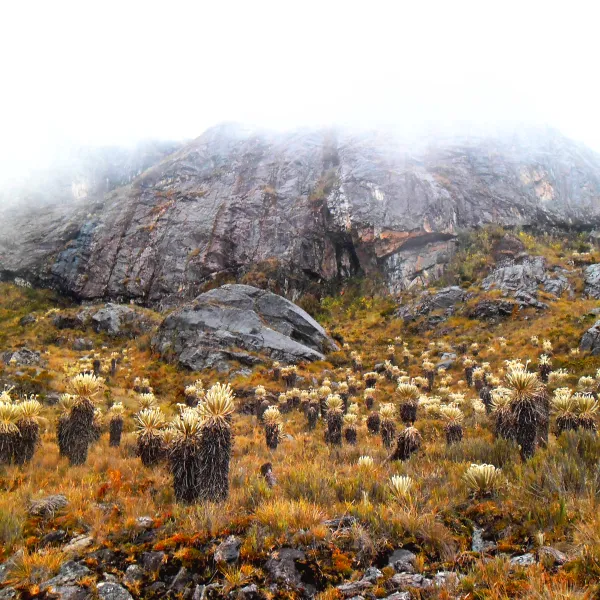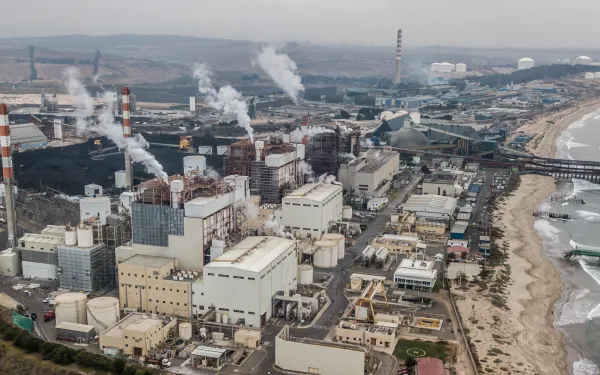
Project
Photo: Alberto Peña KayProtecting the Santurban Páramo from mining's damages
In the Andean region, high-altitude forests and wetlands called páramos capture water from fog and supply it to lowlands. In Colombia, nearly two million people rely on the Santurbán páramo for their freshwater supply.
Healthy páramos also capture large amounts of carbon, mitigating climate change, and provide refuge for hundreds of threatened species, including the iconic spectacled bear.
The land in and around the Santurbán páramo contains gold and other minerals. A Canadian corporation, Eco Oro minerals, wants to build a gold mine that would leak large amounts of cyanide and arsenic into the water coming from the páramo.
AIDA’s advocacy helped to convince the Colombian government to:
- Deny an environmental license for the Angostura mine in May 2011.
- Protect, in 2013, 76 percent of the Santurbán páramo from industrial activities—a much larger percentage than originally proposed
Together with our partners, AIDA advocated for the World Bank's divestment from the Angostura mining project, which we achieved in December 2016.
We also supported litigation that led Colombia’s highest court to reaffirm in February 2016 that mining in páramos is prohibited.
However, 24 percent of the Santurbán remains unprotected because it was not officially designated a páramo during the government's delimitation process, which was invalidated by a court system in November 2017 due to failure to consult with affected communities.
The government must now realize a new delimitation process in consultation with residents of the area. Meanwhile, the threats to Santurbán continue, with Eco Oro still angling to build its mine and another mining project seeking establishment nearby.
Partners:

Related projects

A healthy environment: what is this universal right?
The triple crisis facing the world highlights the importance of guaranteeing the right of all people to live in a clean, healthy and sustainable environment.Climate change, biodiversity loss and pollution are among the greatest threats to humanity today, seriously affecting the exercise and enjoyment of human rights. It’s enough to mention just a few examples:Air pollution is one of the main environmental threats to health, causing seven million premature deaths each year.In the last 10 years, extreme weather events have caused 220 million displacements, or about 60,000 per day. These and other impacts disproportionately affect individuals, groups and communities who are already in a situation of vulnerability.For women, for example, environmental degradation means the reinforcement of pre-existing inequalities and situations of discrimination in matters such as access to and tenure of land and natural resources. Children, for their part, suffer more intense impacts due to their less developed physiology and immune systems. And for indigenous and traditional peoples, the defense of their territories and livelihoods in the face of environmental damage represents serious threats, even to their lives.But what is the right to a healthy environment? Components of the right to a healthy environmentThe right to a healthy environment is increasingly included in constitutions, laws and regional justice systems. Although the definitions vary, the essence is the same. The general understanding is that to make it a reality requires two basic types of elements:Substantive elementsClean air.A safe and stable climate.Access to clean water and adequate sanitation.Healthy and sustainably produced food.Non-toxic environments in which to live, work, study and play.Biodiversity and healthy ecosystems.Procedural elementsAccess to information.Public participation in decision-making.Access to justice and effective remedy. The realization of this right also requires international cooperation, solidarity and equity in environmental actions (including the mobilization of resources), as well as the recognition of extraterritorial jurisdiction in damages to human rights caused by environmental degradation. Dimensions and qualitiesThe right to a healthy environment has both a collective and an individual dimension. Under the former, it constitutes a universal interest owed to both present and future generations.The individual dimension implies that violating this right can have direct and indirect repercussions on individuals due to its indivisible and interdependent relationship with other rights, such as the right to health, personal integrity or life, among others.As the Inter-American Court of Human Rights concluded, given that environmental degradation can cause irreparable harm to people, a healthy environment "is a fundamental right for the existence of humanity.”It is also an autonomous right that protects the components of the environment (forests, rivers, seas and others) as legal interests in themselves, even in the absence of certainty or evidence of risk to people.The autonomous nature of this right and its interconnection with other rights entails a series of obligations for the States, which include to:Prevent significant environmental damage; which implies regulating, supervising and overseeing activities that may generate risk or cause damage to the environment.Carry out environmental impact studies, establish contingency plans and mitigate damages.Act in accordance with the precautionary principle in the face of possible serious or irreversible damage to the environment, affecting the rights to life and personal integrity, even in the absence of scientific certainty.Cooperate with other States in good faith for protection against significant environmental damage.Guarantee access to information on possible environmental impacts.Guarantee the right to public participation in scenarios that may affect the environment and guarantee access to justice.Given the urgent need for new and better ways to protect the environment, the United Nations’ recognition of a healthy environment as a universal human right on July 28, 2022 marked a historic step forward in the long and complex process of guaranteeing this right in practice, which has been part of AIDA's history since its inception.At AIDA, we’ve long worked to highlight the link between a healthy environment and other human rights. And we’re committed to fulfilling our mission: to strengthen the capacity of the people in Latin America to guarantee their individual and collective right to a healthy environment.
Read more
When the energy transition isn’t just: The case of Quintero and Puchuncaví in Chile
By Cristina Lux and Florencia Ortúzar * The energy transition in Chile will inevitably occur. In fact, it is already underway. The country doesn’t have large deposits of fossil fuels, but it does have abundant renewable energy resources. It only makes sense, then, that prior dependence on coal should naturally shift to the sun, wind and other renewable sources. Today, after decades of struggle by local communities, the closure of Chile’s original 28 coal-fired thermoelectric power plants is underway as part of the Decarbonization Plan promoted by the government in 2019. Eight have closed, six others have a future closure date, six more are in the process of establishing one, and eight do not yet have a closure plan. If the government and private actors deliver as promised, the thermoelectric plants as a whole should close before 2040, freeing Chile from the energy derived from burning coal. But the history of coal dependence will undoubtedly leave a deep mark. For many years, Chile obtained more than 50 percent of its energy from thermoelectric plants, all located in just five locations, known as "sacrifice zones." The people who live in those areas have long suffered at the expense of generating electricity for the rest of the country. The story of one of the most emblematic of Chile’s sacrifice zones, the bay of Quintero and Puchuncaví, demonstrates why the transition not only must occur, but why it has to be just. A beautiful seaside resort battered by pollution With a little more than 40 thousand inhabitants, the bay of Quintero and Puchuncaví is located two hours by road from the country's capital. The families there have historically lived from agriculture, artisanal fishing and tourism, ways of life that have been extinguished by the relentless advance of intensive industrial activity. Photo: Claudia Pool / @claudiapool_foto / www.claudiapool.com Today, the site is home to more than 30 different companies: a coal-fired thermoelectric complex, gas-fired thermoelectric plants, a copper refinery and a petroleum refinery, a regasification port, a cement plant, ports that receive coal and other fuels, as well as coal and ash storage centers, among others. Public information regarding the emissions of this mix of companies is deficient and the lack of regulations governing them is abysmal. In fact, only a few pollutants are regulated. The rest are not even measured, despite the fact that several are dangerous to human health. And so, paradoxically, the monitoring stations show normal levels as people are being intoxicated in the streets and schools. In the bay there are often mass poisonings of adults and youth, many of whom end up in the hospital. In these cases, schools are closed, but businesses are not, and the wind is monitored to activate protocols in case of poor ventilation. The blame is placed on the lack of wind instead of on those responsible for the pollution. It’s also common to see coal deposits on the beaches, which stain the sands. In 2022 alone, more than 100 episodes were recorded. It’s alarming how the situation affects local children, who are particularly vulnerable to pollution due to its effects on human development. The impact on women is also disproportionate, as they are the first to be forced to leave their jobs to care for sick family members since they bear the brunt of the care work. Things have not been done well in this beautiful coastal area. Today, new projects and the expansion of industrial operations continue to be approved. But the community is rising up, demanding a truce for this area. It is time to move towards ecological restoration in Quintero and Puchuncaví. Signs of hope Some recent events are giving hope that things could improve in the bay and that this area, which for years has been sacrificed in favor of the rest of the country, could once again show its beautiful beaches and wonderful fishing and agricultural resources to Chile and the world. Although the situation is not yet cause for celebration, some things seem to be moving in the right direction. One important step was the environmental damages lawsuit filed in 2016 by local communities against the government and all the companies in the industrial corridor. The process has been long, but a final judgment is expected soon. Meanwhile, in 2019, the Supreme Court resolved several appeals for protection for episodes of mass intoxications, giving reason to the communities and issuing a landmark ruling, perhaps the most important on environmental matters in Chile. The ruling orders the State to comply with 15 measures to identify the sources of contamination and repair the environmental situation in the area. Sadly, this ruling has not yet been properly implemented. Moving forward, the Supreme Court recently issued three rulings that refer to non-compliance with the 2019 ruling and provide tools to enforce compliance. Also, two of the four thermoelectric plants of the U.S.-owned AES Andes have closed operations in the bay. Two remain. Finally, in May, after 58 years of operation, the furnaces and boiler of the Ventanas Smelter were finally shut down. Thus, the icon of pollution in the area—a 158-meter chimney that consistently expelled pollutants—ceased to operate. The search for justice is far from over Despite the good signs, there is still no secure future for the people of Quintero and Puchuncaví. That’s why we must continue to demand justice and a transition that protects the most vulnerable people. Photo: Claudia Pool / @claudiapool_foto / www.claudiapool.com Although two of the four AES Andes thermoelectric plants operating in the bay have closed, the companies that owned them have been granted "strategic reserve status," whereby they are paid to remain available to operate again if required. On the other hand, although the copper smelter of the state-owned Corporación Nacional del Cobre closed, the refinery continues to operate in the area. There was a relocation plan for the workers, but no remediation plan for the communities that for almost six decades breathed the toxic waste of that industry. In addition, projects continue to be approved without the participation of the communities. This is the case of the Aconcagua desalination plant, which intends to desalinate water to transport it through subway pipes over 100 km to supply the Angloamerican mining company. Last but not least, decarbonization in Chile seems to bring an increase in the use of gas, which has been falsely labeled as a "transition fuel." It’s expected that gas activity in the area—which hosts one of the country's two LNG (liquefied natural gas) regasification ports—could intensify and, with it, so could its environmental impacts. Chile has the opportunity to set an example of just transition Chile, located at the end of the continent, has the opportunity to do things right. There are indications they’re moving in the right direction; the only thing missing is the political will to change course. The region of Quintero and Puchuncaví deserves the opportunity to shine again and to reach its full potential as a colorful coastal town and seaside resort with an identity rooted in agriculture, tourism and artisanal fishing. In this case, a truly just transition must include the closure of polluting companies that are making people sick. But it must also involve the participation of those people affected, putting the respect of their human rights at the forefront—a respect that was so diminished over the last six decades. The injustice that has weighed on the territory and its inhabitants must be recognized—establishing reparation mechanisms, ensuring non-repetition, and involving the people themselves in the environmental recovery of the area. Only in this way will the communities recover their capacity for agency—that power to decide and to be part of the decisions that affect them—which was taken away from them so many years ago. *Cristina Lux is an attorney with AIDA's Climate Program and Florencia Ortúzar is a senior attorney with AIDA.
Read more
Right to a healthy environment global coalition wins UN Human Rights Prize
Manila (PHP), Geneva (CH), Casablanca (MAR), New York (US), Mexico City (MX), Buenos Aires (ARG) — Today, the Global Coalition of Civil Society, Indigenous Peoples, Social Movements, and Local Communities for the Universal Recognition of the Human Right to a Clean, Healthy, and Sustainable Environment was recognized as one of the recipients of the prestigious 2023 United Nations Human Rights Prize. The coalition is awarded for its essential role in advocating for the recognition of the right to a healthy environment by the UN General Assembly (UNGA) in July 2022. The UN Human Rights Prize is awarded once every five years to several recipients at a time. This year is the first time that it has been granted to a global coalition. The prize will be presented in New York on December 10, which also marks the 75th anniversary of the Universal Declaration of Human Rights, making this recognition even more special. This achievement was only possible thanks to tireless efforts that began decades ago and resulted in thousands of people from all across the globe joining forces to achieve a milestone: the recognition by the United Nations of the human right to a clean, healthy, and sustainable environment. First and foremost, the award highlights the importance of collaborating to advance the much-needed protection of our planet and fulfillment of human rights. Alone, no organization, movement, or person would have been able to achieve the universal recognition of the right to a healthy environment. Together, a diverse global coalition made this a reality. Furthermore, the prize recognizes the need to protect participatory spaces for everyone. As civic spaces are worryingly shrinking and many human rights and environmental defenders are under attack worldwide, the award sends a strong reminder: It is essential to respect and strengthen spaces for participation and collaboration. The protection of civic spaces and the respect and support for all human rights defenders is essential for the effective implementation of this newly recognized right. The right also is an integral component of environmental justice and democracy and provides a seamless path to protecting the rights of future generations. This announcement arrives just a few days ahead of the July 28 anniversary of the UNGA’s recognition of the human right to a clean, healthy, and sustainable environment. Since then, millions have continued to experience the cumulative and accelerating impacts of the triple planetary crisis of biodiversity loss, climate change, and pollution, exacerbated by systemic inequalities, that is contributing to ongoing violations of the right to a healthy environment around the world. This prize emphasizes that today more than ever, States must make this right a reality. It is both a recognition and a call to action for governments, businesses, institutions, and people worldwide to ensure that the right to a clean, healthy, and sustainable environment is effectively guaranteed and legally protected so that it can be enjoyed by all. Read the reactions from the members of the coalition here. press contact: Víctor Quintanilla (Mexico), AIDA, [email protected], +521 5570522107
Read more